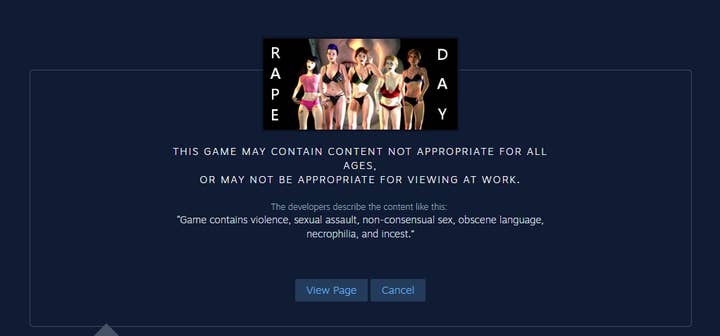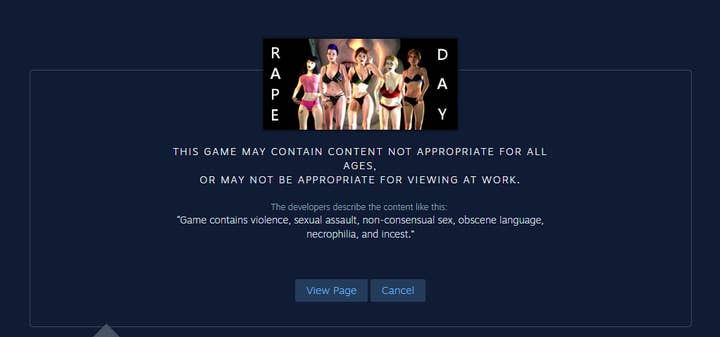Steam is in the rape fantasy business | Opinion
Upcoming visual novel highlights the problems with Valve's refusal to apply content standards to its storefront
It's only Tuesday, but it looks like this week's big controversy will be (once again) Valve's utter lack of interest in applying any sort of reasonable standards to its storefront.
The game encapsulating that lack of interest this time is Rape Day, an upcoming self-published visual novel from a developer calling itself Desk Plant. Billed as "a game where you can rape and murder during a zombie apocalypse," it also features necrophilia, incest, and until recently, infanticide. (The developer apologetically noted in an update that the infanticide scene was cut to avoid having the game banned from the store for "child exploitation.")
The "About This Game" section on the Steam store page sells the player fantasy, saying, "Control the choices of a menacing serial killer rapist during a zombie apocalypse. Verbally harass, kill, and rape women as you choose to progress the story. It's a dangerous world with no laws. The zombies enjoy eating the flesh off warm humans and brutally raping them but you are the most dangerous rapist in town."
The first developer update on the game is dated February 19, so Valve has hosted this on its site for two weeks. In that update, Desk Plant states, "It's for a niche audience; If it's not your type of game you definitely don't need to play it but as other's have said I tried to make a game that I would enjoy playing, and there are other people like me. 4% of the general population are sociopaths and the type of people that would be entertained by a story like this is not even limited to pure sociopaths."

The first thing that comes to mind here is Valve's content policy for Steam, which it proclaimed last year would allow everything, "except for things that we decide are illegal, or straight up trolling." While that policy gives wiggle room to deal with controversial titles one way or the other, it also presents a lose-lose situation for Valve.
In the case it permits Rape Day to sell on Steam, Valve risks pushing away anyone with aspirations of respectability or mainstream acceptance.
Do the AAA publishers of the world want to sell their games on a storefront that proudly hosts rape fantasies as a matter of principle?
Do the AAA publishers of the world want to sell their games on a storefront that proudly hosts rape fantasies as a matter of principle? Valve is already facing enough competition from Epic Games store, Discord and the like that it lowered its revenue share for the sort of multi-million selling titles AAA publishers produce. And companies like Deep Silver and Ubisoft already feel comfortable skipping Steam with Metro: Exodus and The Division 2, respectively.
If Valve wants to go to bat for Rape Day, it is giving its aggressive and deep-pocketed storefront competitors a huge opening to steal away the most reputable and profitable publishers on its service.
And in the case Valve prevents the game from ever launching, it probably makes the more pragmatic decision from a profitability standpoint. But it still takes a hit to its reputation for allowing the game page to go up in the first place, for hosting it for weeks, for working with the developer to determine where it could be legally sold (according to one of the developer's updates), and then for backtracking when the entirely predictable backlash hit. Valve loses standing with those upset it would make a business out of rape fantasy games, as well as those upset it would curtail creative expression.
Free speech can be costly
In fact, Valve's content policy sounds more than a little like 8chan's content policy, which everyone became more familiar with last week when THQ Nordic decided 8chan would be a good place to hold an Ask Me Anything session to promote their games. An anonymous imageboard established as a more free speech alternative to 4chan after that site banned discussion of GamerGate, 8chan's only rule is to not post or link to content that is illegal in the United States, where its servers are located.
The refusal to apply any kind of values to content moderation turns your platform into a cesspool overflowing with people whose speech is not welcome anywhere else in society
Both are clearly embracing freedom of speech as a core value, something Valve even pointed to when it announced its content policy, saying, "the games we allow onto the Store will not be a reflection of Valve's values, beyond a simple belief that you all have the right to create and consume the content you choose."
The statement would be more accurate if we replaced "a simple belief" with "an overriding belief." It's nothing more than a declaration of priorities. Valve prioritizes the freedom to create and consume content of your choosing to the exclusion of all other values it might have. Permitting Rape Day on the storefront isn't a statement that Valve believes rape is a societal good and should be promoted as such; it's just that Valve cares about helping interactive rape fantasies reach as large an audience as possible more than it has an opinion of any kind about rape.
As a business that makes money by selling games, there's a certain depressing logic to that. But a business is just a collection of people who make all of that business' decisions and policies. And for an individual, that prioritization of values is genuinely appalling.
If you look at 8chan, you can see where this prioritization leads. The refusal to apply any kind of values to content moderation and community management certainly does protect people's right to free speech, but it also turns your platform into a cesspool overflowing with people whose speech is not welcome anywhere else in society. The kind of free speech worth protecting has plenty of other outlets it can pursue in our industry and our world, ones that don't serve to normalize and amplify humanity's many failings.
Granted, Valve's "no trolling" limitation means it's not as dogmatic about free speech as 8chan is, but it's a strange place to draw the line. It means literally the only thing Valve is offended by, the only action so horrific it causes the company to apply its own values and make a judgment call--is jerks trying to stir the pot for a laugh.
What platforms like Steam and 8chan seek to do when they value free speech above all is to give themselves permission to be thoughtless
As a journalist, I'm a big fan of free speech. I've built my livelihood on it. But one of the first things this field taught me is that rights carry with them responsibilities.
Free expression is a powerful thing, but you have to be thoughtful about how you exercise that power. What platforms like Steam and 8chan seek to do when they value free speech above all is to give themselves permission to be thoughtless. To not think about where they'll draw the line. To not worry about what horrid ideologies they are elevating and amplifying with their platform. To not concern themselves with the impact they are having on the world. To not consider why one depiction of rape in a game is acceptable and another is not, why it's acceptable to go on a murdering spree in the AAA blockbuster du jour but not Active Shooter, or why one prurient anime game is pornography but another is not. (That last question was essentially what prompted Valve to adopt its new content policy.)
I get why they would do this. It's not especially fun to think through these things, and you rarely wind up with a clear dividing line between acceptable and unacceptable. It's not a satisfying exercise; you never get confirmation on which calls were right and which ones were wrong. And it's nearly impossible to be consistent in applying the same set of values to each decision. But choosing not to make these calls is still a choice. Finding an excuse to forego the exercise entirely doesn't make you a principled defender of free speech; it makes you a moral coward.
So what's the response?
You may have picked up on my anger on these subjects. You may also note that it's not primarily directed at Desk Plant or 8chan. While I find both indefensible and without redeeming qualities of any kind, I can't say I expected any better of them. There will always be assholes, for lack of an equally concise word. Any individual can devote their limited time in life to spreading darkness and hurting other people, and I'm not convinced we could ever stop that from happening.
A tasteless game can be made by one person, but it takes the 170 people who make up Valve to make the game available to 125 million more
Their actions can create tragedy in and of themselves, but that tragedy can be compounded exponentially by the ways we collectively respond to them, the ways we ignore, accept, defend, normalize, and even promote them.
It only takes one PR person making a catastrophically bad decision to have an otherwise respected publisher openly courting a community that welcomes Nazis and racists, but it takes licensors of children's games and platform holders to decide such an action isn't worth publicly condemning, much less severing their business ties over. It takes the Entertainment Software Association to say nothing when one of its member companies is undermining their shared cause, directly marketing to the boogeymen that concerned parent groups have always imagined occupies every corner of gaming.
A tasteless game can be made by one person, but it takes the 170 people who make up Valve to make the game available to 125 million more, to give it a stamp of legitimacy in our culture. It takes the thousands more at Electronic Arts, Activision, Bethesda, Ubisoft, Take-Two, and every other publisher on Steam to share the platform with this content, to say that they have no problem selling their games on the same digital shelf as Rape Day.
It's time to start making these companies answer for their responses -- or lack thereof -- to the actions of the people they choose to do business with.
Valve did not return a request for comment. Neither did Electronic Arts, Ubisoft, Activision Blizzard, or Bethesda, all of whom sell games through Steam. Take-Two declined to comment.

